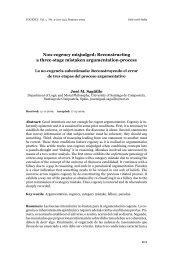Cogency v2 n2
Cogency v2 n2
Cogency v2 n2
You also want an ePaper? Increase the reach of your titles
YUMPU automatically turns print PDFs into web optimized ePapers that Google loves.
COGENCY Vol. 2, N0. 2, Spring 2010<br />
body problem implies we recognize the existence of something specific only<br />
to mind, does this mean that philosophy is not able to study the mind-body<br />
problem? Taken strictly, premise three implies that philosophy can only<br />
study ontology, given that there is only one substance. We could try to rework<br />
the second premise:<br />
2* Philosophical study of practical reasoning involves the finding of solutions<br />
that hold with equal validity for all cases of practical reasoning.<br />
But this argument is not sound. Premise 2* is false for the reason already<br />
explained. Philosophical study may well argue that, for example, inquiry<br />
has some property P that no other forms of reasoning have and go on<br />
to study that property. I will not try to argue for the conclusion that philosophical<br />
study of practical reasoning involves also the study of cases that<br />
exhibit optionality, and the nature of ‘optionality’, here. I conjecture that<br />
the correct answer is the same as why philosophy studies anything it studies,<br />
but this is beyond this review. We should also note that the following<br />
reasoning is not valid:<br />
1. Some cases of practical reasoning exhibit optionality (i.e. the incommensurability<br />
of justifications for different actions).<br />
2. Therefore, these cases of practical reasoning cannot be decided on a<br />
merely rationalist basis.<br />
Incommensurability of the relevant sets of premises does not imply that<br />
the rational thing to do when faced with it is to turn to non-rational elements.<br />
This is not to deny that there are no situations in which some standards<br />
of rationality do not yield a decision between options. But the previous<br />
argument does not establish its conclusion. Besides, one can often still<br />
weigh arguments, try to search for new backings for warrants, try to justify<br />
the selection of some grounds (as suggested in G. Thomas Goodnight’s article<br />
discussed above) and so on. In short, the lack of conclusive answers<br />
does not imply the lack of rational answers. Kock (pp. 258-259) further<br />
suggests that the reason why philosophers might refuse to accept optionality<br />
is that it seems to leave them at a dead end. Leaving aside the fact that this<br />
ad hominem proves nothing about the nature of practical reasoning, I would<br />
170








